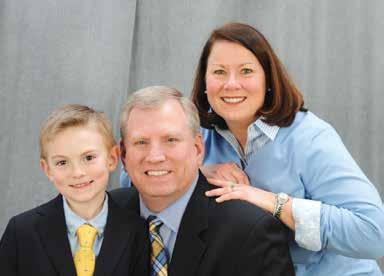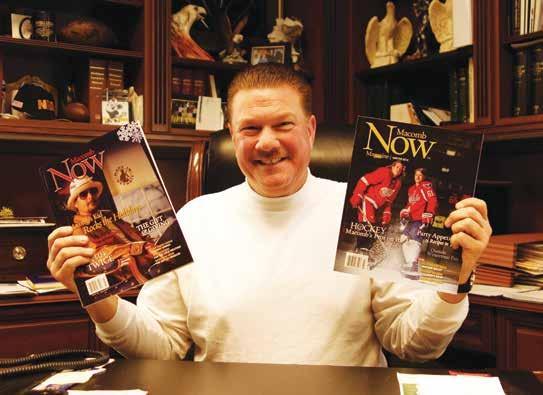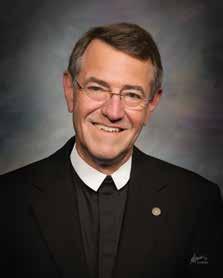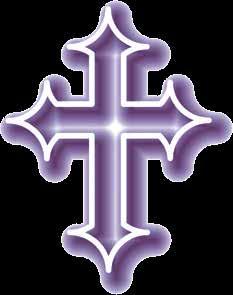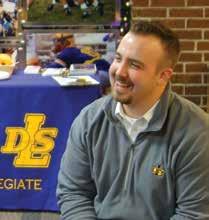
10 minute read
Conversation With Christian Financial Credit Union
Conversation With...
Banking Program Offers Practical Experience, Financial Literacy
Since 2010, the Christian Financial Credit Union (CFCU) has been affiliated with De La Salle, both in and out of the classroom. CFCU created an actual branch within De La Salle, staffed by a branch administrator and students who are enrolled in the yearlong DLS Banking class. The class focuses on various aspects of Banking as well as Financial Literacy. Included in the conversation were Mr. Patrick Adams (Principal of De La Salle), Mr. Dennis Koch, (DLS Faculty), Mrs. Aarran Meier (CFCU at DLS Branch Administrator), and Ms. Christine Quitter (Business Development Director for CFCU).
De La Salle has had an outstanding academic curriculum, with College Preparatory, Honors, and Advanced Placement classes. Why create a coop program within the school and add a Banking class?
Patrick: At my previous school, I brought in a full-service credit union for the students to work in and have as a resource. It emerged mainly from witnessing the power of the co-op program and the influence it had on the students. There was motivation and commitment there that was apparent in the kids that were able to exercise the opportunity. When I came to DLS I began the same process. We brought in three credit unions who responded to my solicitation for setting up a full-service operation complete with a course in banking. As part of their March trip to Chicago, DLS Banking students visited the Chicago
Board of Trade. (L. to R.) Mrs. Aarran Meier, Paul DiTrapani, Mr. Dennis Koch, Alex Poulos, Rick Santelli of CNBC, Nate Nordstrom, Jonathan Evans, Michael Smigiel, and James Stehlin. CFCU was the top candidate and was chosen for their passion, commitment to the community, and fidelity to our Lasallian Catholic mission.
From CFCU’s perspective, what’s the aim of the program?
Christine: We have several goals. One is to provide financial literacy, and another is to provide the students with practical job experience. For CFCU, it’s an opportunity to build a customer base with not only the students but also their parents. And it’s good for us to have students who are interested in the banking industry gain some practical experience. They’re not just a teller. We expose the kids to other aspects of the banking industry, such as marketing and accounting. Aarran: We don’t just educate students in class. They are able to help their peers have a better understanding of financial literacy. It’s a nice foundation for going out in the real world.
The opportunity to be in a Banking Class and to get practical training and experience attracts a lot of students. What goes into the selection process?
Christine: We know that the school begins its course registration process with students in February, so we start in January. Students fill out the same employment application that we have at CFCU, and then we interview students. We encourage lots of kids to apply. About 25 apply each year, and we select 10 - 12.
Christian Financial Credit Union
Aarran: Such top-notch kids apply. It is really amazing. It’s a great opportunity for them and for us to have such good kids.
Christine: Some kids have never filled out an application or been through a job interview. That alone is good experience for them.
An actual credit union within a school building is unusual. Where is the CFCU at DLS?
Aarran: We’re located right next to the Cafeteria, in a space that used to be a classroom. In fact, the space was originally a tiered choral classroom. CFCU renovated the space, and created a true-bank like setting, with teller windows.
After a student is selected for the program, how does he get trained to actually work inside the DLS CFCU?
Christine: We have seven CFCU branches, and we have a two-week mandatory training at our Center Line Branch. Aarran teaches them, and other departments come in and go over all aspects of the credit union. The students are then assigned to a branch near their homes for another week, depending on their schedules. Aarran: The students are paid during training, and paid for working throughout the summer. A lot of students work at their local CFCU branches during the school year, on weekends, vacations, and now, through college. For those who have been able to get into the program during their junior year, they can end up working that summer before 11th grade, then the summer before 12th grade, and then that summer before college. They can manage to earn quite a bit of money.
Students are working as tellers. What kinds of security precautions are in place?
Aarran: The same kinds of precautions we use at any of our CFCU branches: an ID, a signature for withdrawals. I handle adult transactions.
Do many students and staff members use the CFCU?
Aarran: Yes, and each year it’s grown. We have about 250 student accounts. The current seniors were freshmen when we started, and they’ve learned to come in and make deposits and withdrawals. And they’re more comfortable asking questions. It’s nice for them because it’s here in school, in a safe environment.
CFCU Banking Student Moves On To A Career In Finance
Joe Wiles, ‘11, is currently attending the University of Chicago. He was in the first group of CFCU-Banking students.
Joe said, “The CFCU experience was an invaluable introduction to banking from a professional perspective at a young age. It is uncommon to gain exposure to the type of work that we did as seniors in high school. The experience was quite educational and informative - from undergoing formal training at a CFCU branch, to the day to day responsibilities at the De La Salle branch, to the introductory banking course that accompanied the program. “I chose to attend the University of Chicago after graduating, and decided to major in economics. After my first summer, I returned home to work at a law firm in Detroit, as law was my preferred career path at the outset of my college career. However, a variety of influences on campus, combined with the spark of my exposure through Christian Financial, influenced me to pursue an internship in the financial services industry following my second year.” Joe has since completed an 11-week internship in New York City during the summer of 2013, performing equity research and portfolio management projects for an asset management firm called New Amsterdam Partners. He calls the internship “an incredible experience which motivated me to continue pursuing a career in finance.” This coming summer, Joe has been offered a position with Goldman Sachs in the firm’s Chicago office, within their Private Wealth Management division.
CFCU, Continued
Christine: We’ve had students who have accounts, and then their parents start an account with us, and in some cases, have moved their business accounts to CFCU.
Do students have checking accounts? Debit cards?
Aarran: A student can have an account with a debit card as early as age 14 - they need to have a joint account with their parents.
Can grandparents create accounts for their DLS grandsons?
Christine: Absolutely. We encourage all DLS students to have an account to promote saving for the future.
Typically, someone doesn’t earn a teaching certificate in banking. What qualifies you, Aarran, and you, Dennis, to teach this course?
Aarran: My college degree was in Education, and I began teaching fifth grade at St. Jude Grade School (Detroit). I started working part-time at CFCU, and that turned into a full-time job. Dennis: I have an undergraduate business degree from Michigan State University. I am also certified in Economics and Business Education.
What topics do you cover in the Banking Class?
Dennis: CFCU CEO Patty Campbell found us a textbook through the American Bankers’ Association. The class isn’t about becoming a robot teller. It’s more complicated than that. Students learn the laws and regulations, personal finance, investments, 401k’s, technology and trends in banking, and marketing.
Kids learn about marketing during the summer training. Do they do marketing during the school year?
Christine: In the fall, once the curriculum gets going, we talk with the kids and promote “Get in the Game,” to encourage savings to earn points. At the end of the year, kids can redeem their points for merchandise, like Tiger tickets. We had a student last year who had earned so many points, he was able to have three separate pizza lunches for his friends. We also have several Christian Financial Credit Union sponsored events throughout the year that the kids work and help promote our services.
A lot of kids graduate from high school, and have no idea how to handle money. How do the Banking Students promote financial literacy?
Christine: We work on that in several ways. One thing we’ve done is participate in Money Smart Week. This is a public awareness campaign designed to help consumers better manage their personal finances. The kids get the opportunity to participate in activities to promote saving money. They also attend the “MSW Kickoff” which takes place downtown at the Federal Reserve. Several guest speakers from our local media are in attendance to help promote this great event. Dennis: We have a field trip to the Federal Reserve in Detroit during Money Smart Week, and this year, our three-day trip to Chicago was fantastic. We went to the Federal Reserve in Chicago, and also the Board of Trade. We were there, on the floor, and could see the live trading going on. It was almost like a movie set. We also talked with Rick Santelli from CNBC, who primarily reports from the floor. It was a great experience for all of us.
The CFCU and the Banking program has been in place now for four years. Is the program successful?
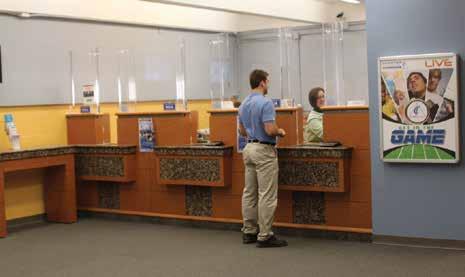
Dennis: I feel the program is very successful because of the unique partnership between De La Salle and CFCU. This is a great opportunity for our students to learn not only about banking, but to gain advanced financial knowledge. Several are interested in pursuing careers in finance. And it’s a great first job. This is definitely a resume builder. Christine: We have all kinds of kids involved in the program. We have some kids who are shy or reserved, and they are forced to speak and interact because they are working here. This helps them with their social skills. We’ve seen kids really blossom. We don’t have “cookiecutter” kids in the program. What’s nice is seeing kids who really didn’t know each other make new friends. They make each other better.
Aarran: They gain confidence that carries over to other aspects of their lives. They get a great real world experience in a safe comfortable environment.
Christine: Aarran is here for their entire experience, from the time they are accepted, through summer training, then checking in with them as they work in other branches through the rest of the summer, and then through the school year in the classroom and here in the branch. She is here to supervise, but to help them be as independent as possible in carrying out their CFCU responsibilities. Patrick: The relationship has surpassed our original expectations. CFCU has become not only a partner in many respects, but has provided a link to financial literacy to all of our students.
CFCU, Continued
Gathered outside the Federal Reserve in Chicago are (L. to R.) Jimmy Stehlin, Mr. Dennis Koch, Jonathan Evans, Paul DiTrapani, Brendan Johnson, Nate Nordstrom, Ernie Gordon, Brenden Childs, Alex Poulos, Michael Smigiel, Ben Serra
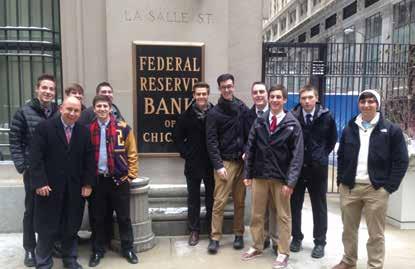
Banking Students visit Chicago Federal Reserve
In early March 2014, the DLS - CFCU Banking students, accompanied by Mr. Dennis Koch and Mrs. Aarran Meier, traveled to Chicago to visit the Federal Reserve and the Board of Trade. The students also enjoyed some sightseeing and attended a basketball game at Northwestern University. Senior Jonathan Evans said, “It was a unique experience. We learned a lot about what the Board of Trade really does, and how it affects the current market. We learned that technology is really taking over, and the human role is diminishing.” Jonathan plans to major in Business at the University of Michigan. Senior Jim Stehlin, also headed to Michigan and a major in Business, signed up for the Banking class after taking Mr. Koch’s Economics class his junior year. “I found it interesting to see the people in the ‘pits.’ We talked with various traders; sometimes they represent themselves, some are backed by financial companies. They make a difference in the entire global economy.”

